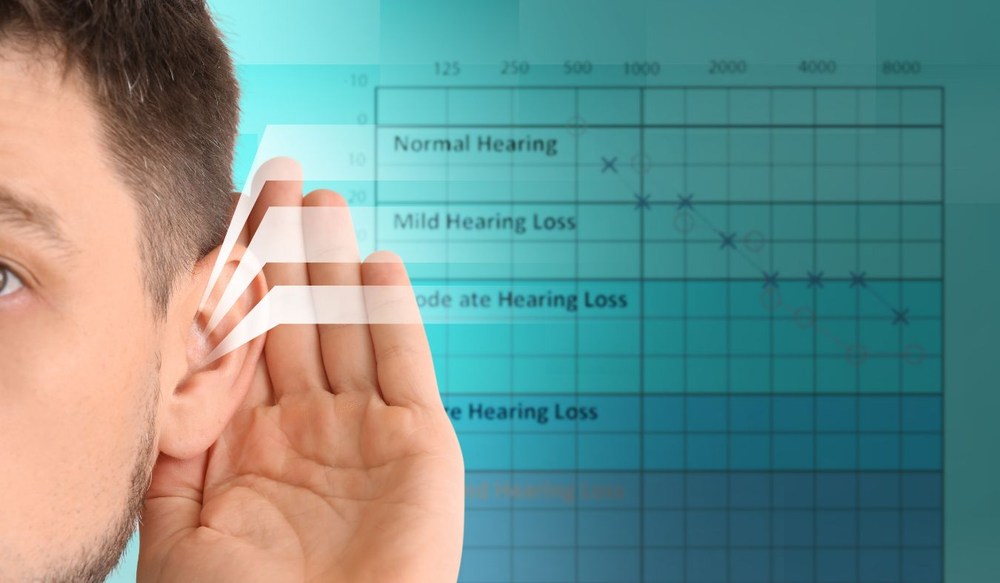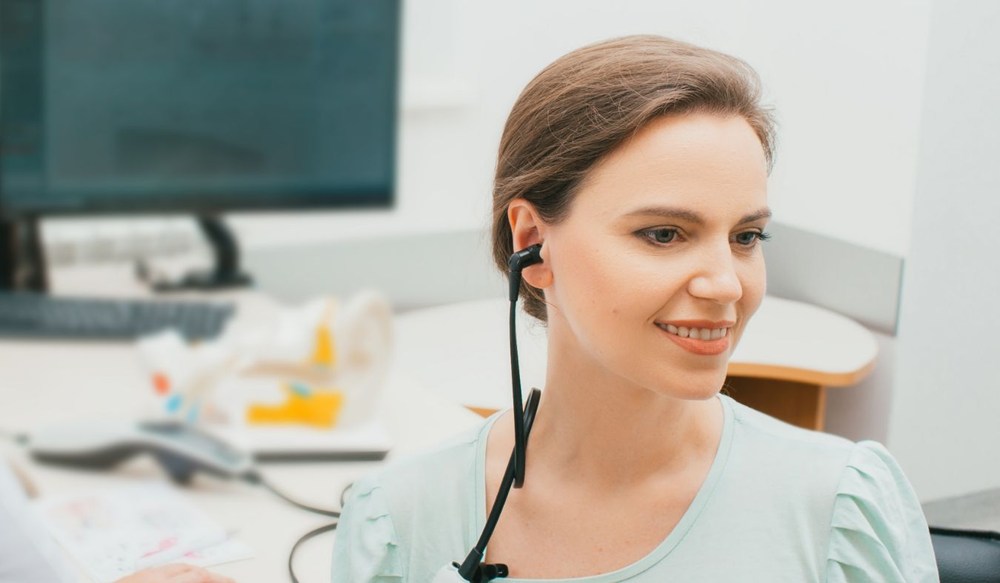How to Advocate for Yourself During a Hearing Test
A hearing test isn’t just something that happens to you while you

By: admin | July 29, 2025
Summer is a time for outdoor barbecues, beach trips and long walks in the sunshine. If you wear hearing aids, you probably don’t want to miss out on these activities just because the weather gets hot. Your hearing aids are built to withstand daily use, but like most electronic devices, they can be affected by extreme heat, humidity and moisture. Whether you’re spending time in your garden, attending an outdoor wedding or simply walking to your car on a sweltering day, summer weather presents some unique challenges for keeping your hearing aids working their best.
The good news is that with a little awareness and some simple precautions, you can enjoy all your favorite summer activities without worrying about your hearing aids. Heat-related issues are usually preventable when you know what to watch for and how to protect your devices. Understanding how summer weather affects your hearing aids helps you take the right steps to keep them functioning properly, so you can focus on enjoying the season rather than dealing with technical problems. With the right care, your hearing aids can handle summer heat just as well as they handle everything else you do throughout the year.
High temperatures can create a range of challenges for hearing aids beyond just making them uncomfortable to wear. The tiny electronic components inside your devices are designed to work within a certain temperature range. When exposed to high heat, these parts may begin to malfunction or become less reliable, leading to unexpected shutdowns or reduced sound quality. Batteries are particularly sensitive to temperature changes. Heat can cause them to drain faster than normal or even fail entirely without warning, leaving you suddenly without the support you rely on for clear hearing.
The physical materials of your hearing aids are also at risk in hot conditions. Plastic housings, tubing and earmolds can soften or warp if left in direct sunlight or a hot car, causing them to lose their intended shape. This can affect the fit of your hearing aids, making them feel loose or uncomfortable and even altering how sound travels through them. Changes in shape can impact the acoustic seal, leading to feedback or a drop in sound quality. In addition, repeated exposure to heat can gradually weaken these materials, shortening the overall lifespan of your devices and requiring more frequent repairs or replacements. Protecting your hearing aids from heat helps maintain not only their comfort and fit but also their consistent performance, so you can hear your best no matter the weather.
Humidity and sweat are two major factors that can impact how well your hearing aids work, especially during warm weather and summer activities. Moist air and sweat can get inside your devices, affecting sound quality or even stopping them from working altogether. On humid days, you might notice distorted or muffled sound, shorter battery life, corrosion or buildup on metal parts, or devices shutting off without warning. Sweat can cause similar issues, especially if you are active or spending time outdoors, leading to sound cutting in and out, corrosion on battery contacts, or hearing aids shutting off until they dry out.
To keep your hearing aids working reliably, it helps to take some simple precautions. Wiping your devices with a dry cloth after use and wearing a sweatband or hat can help keep sweat away from sensitive components. Using a drying kit or storing them in a dry place overnight is also an effective way to prevent moisture-related problems. Regular cleaning and proper storage help ensure your hearing aids stay comfortable, last longer and provide clear, dependable sound even in hot, humid conditions.
Hot weather can cause batteries to drain faster than usual. High temperatures speed up the breakdown of chemicals inside batteries, leading to shorter battery life and unexpected shut-offs.
Checking your batteries often during hot days helps prevent being caught with a dead hearing aid when you need it most. If you notice your device is not lasting as long as usual, replace the battery right away and keep spare batteries with you. This habit helps prevent interruptions in your hearing throughout the summer.
When heat starts to impact your hearing aids, you may notice some clear signs. Devices may shut off without warning, batteries might drain much faster than usual or sound could become weak or distorted. The plastic parts may also feel softer or look slightly bent after being in hot conditions.
Paying attention to these changes allows you to address issues early and protect your devices from more serious problems. While checking for these signs takes some effort, early action can help you avoid costly repairs.
Many modern hearing aids are designed with materials that can better handle daily wear, including exposure to warmer temperatures. Manufacturers often use medical-grade plastics and silicone that are durable, lightweight and less likely to warp or degrade when exposed to moderate heat. These materials help maintain the shape and fit of your hearing aids even during summer months or in warmer climates. Additionally, some devices feature reinforced tubing and seals that resist softening or damage caused by heat, helping ensure sound continues to travel clearly through the device.
While these materials provide added protection, hearing aids are still sensitive electronic devices. Even with heat-resistant components, high temperatures can affect battery life, electronics and overall performance. It is important to avoid leaving hearing aids in places where temperatures can spike, like on a car dashboard or in direct sunlight for extended periods. Taking these precautions, along with proper cleaning and storage, will help extend the life of your hearing aids and keep them performing well throughout the year.
Proper storage is key to protecting your hearing aids from heat and moisture during the summer. Always keep your hearing aids in a cool, dry place when not in use. Heat and humidity can damage sensitive electronic components, so it is important to be mindful of where you leave your devices throughout the day.
A hard case or special drying container can provide extra protection, helping shield your hearing aids from high temperatures and humidity that can build up even indoors. These containers often have moisture-absorbing materials to keep your devices dry overnight. Store your hearing aids away from direct sunlight, like on windowsills or outdoor tables, and never leave them in a hot car where temperatures can rise quickly and cause damage.
Dryness is important for both performance and the lifespan of your hearing aids. Moisture from sweat, rain or humid air can quickly get into small openings and cause trouble by affecting the electronics, battery contacts or sound quality. Even a little bit of moisture that gets trapped inside can lead to corrosion over time or cause the devices to shut off unexpectedly.
Using a drying kit or dehumidifier at night helps remove any moisture that builds up during the day, keeping your hearing aids in better working condition. Carrying a soft, dry cloth lets you wipe your hearing aids whenever they feel damp, especially after outdoor activities, exercise or time spent in humid environments. Protective covers made for hearing aids can also help block out sweat and humidity while adding an extra layer of defense.
Regular cleaning during hot weather helps prevent problems caused by sweat, dust and moisture. This can improve the longevity of your devices and ensures optimal function. Maintaining your devices is easy – not just in higher temps – just follow these simple steps:
Swimming, bathing and showering are top situations where hearing aids should always come out. Even if your devices are labeled water-resistant, they are not designed for full submersion. Pools, lakes, oceans and even hot tubs can allow water to enter small openings, leading to damage that affects sound quality or stops them from working. Before any water activity, store your hearing aids in a secure, dry case to keep them safe.
Heavy rain or activities that create constant moisture, like sitting in a sauna or steam room, are also times to take out your hearing aids. Excess humidity can seep inside and lead to corrosion or short circuits. High-contact sports or anything with risk of falling, like some amusement park rides or rough hiking trails, can also be reasons to remove them temporarily to prevent accidental drops or impact damage.
If your hearing aids get wet or become too hot, act quickly to protect them from damage. First, turn off the devices and remove the batteries right away. Dry everything gently with a soft cloth and leave the battery doors open to help air out any moisture.
Do not use a hair dryer, microwave or oven to dry your hearing aids, as this can cause permanent damage. Instead, place your devices in a drying kit or dehumidifier made for hearing aids. If you do not have one, putting them in a sealed container with dry rice or silica gel packets can help absorb extra moisture.
Taking these steps right away may prevent bigger problems and save you from needing repairs. One challenge is that drying kits and other supplies may not always be nearby when an accident happens.
Summer conditions can be tough on hearing aids. If you notice your devices are not working as well after spending time in heat or humidity, it is important to pay attention. Signs you should contact your audiologist include sound cutting in and out, muffled or distorted audio, or sudden changes in volume that do not match your settings. These issues can happen if moisture has built up inside, or if heat has affected the delicate electronics.
Battery problems are another clue. If you find you are replacing batteries much more often, or your rechargeable aids are not holding a charge, it could be from exposure to high temperatures. Plastic tubing or shells that feel softer or seem misshapen may also need professional attention. Your audiologist can check for damage, clean internal parts and make sure everything is functioning the way it should.
If you have tried basic steps like drying your hearing aids overnight or wiping them with a cloth and the problems continue, that is a clear sign to schedule a visit. Acting early can prevent small issues from becoming big repairs. Your audiologist can also give you personalized advice for managing summer conditions, so you can enjoy the season without worrying about your hearing aids.
Summer should be a time to relax, have fun and make memories, not stress about your hearing aids. Staying mindful of heat and humidity helps you avoid the most common problems, like moisture buildup or battery drain. Simple habits like storing your hearing aids in a cool, dry place, wiping them down after outdoor activities and using drying kits at night go a long way toward keeping them reliable. When you take these steps, you can enjoy everything from family barbecues to quiet evenings in the yard without worrying your hearing aids will let you down.
If you ever have questions about caring for your hearing aids in summer or notice anything unusual about how they are working, we are here to help. Contact Hearing Wellness Centre in Windsor, ON at (844) 663-9433 to talk with our team about maintenance, adjustments or solutions for any issues that come up.

A hearing test isn’t just something that happens to you while you
By: admin | October 20, 2025

Summer is a time for outdoor barbecues, beach trips and long walks in the
By: admin | July 29, 2025

When you find yourself asking people to repeat themselves more frequently
By: admin | June 20, 2025
